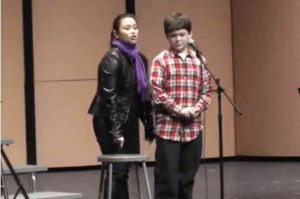Oh, what fun this turned out to be!
Over the last week, I was invited by the University of Miami (UM) and Council Rock High School South (in Holland, Pennsylvania) to hold master classes for their students. Basically, these are advanced classes that an artist or industry professional is invited to conduct. Since I do musical theater, this would be the focus of my classes.
For the UM class, I wasn’t alone. My friend and frequent collaborator Victor Lirio (he directed my last Café Carlyle engagement in 2013 and “Kaleidoscope” concert last March 14) sat by me. We watched and listened to four students sing (everyone in the room was a theater major). We then made adjustments based on their performances. Sometimes, the adjustment was mental; at other times, emotional. Because their vocal performances were already very strong, the more technical aspects of their singing didn’t have to be touched (which was a relief for me—it’s wonderful to just focus on emotional content and lyric interpretation).
As for Council Rock South, I shared the stage with choir director Corey Axler (he’s like a real-life Will Schuester from “Glee”), who asked questions about my own experiences as a performer. I listened to students (some were sixth-graders, others were in high school) as they sang different musical theater selections. Corey had earlier said these were talented kids, but I wasn’t prepared for how absolutely incredible they were. They picked songs that highlighted their strengths and interpreted them wonderfully. Only very minor adjustments had to be made (in the case of one little girl, none at all), as they were all already astonishing. I just sat there flabbergasted.
To Greg Brown from the University of Miami and Corey Axler from Council Rock South, thank you for the invitations! The students were all so inspiring!
Here are a few examples of adjustments made during those master classes:
1) Make it personal
Actors often have to play roles that seem far removed from their own life experiences. They have to sing songs that, at face value, have nothing to do with them at all. However, if we mine a song lyric well enough, we are bound to find hidden bits of information that will tell us there’s something in there that is relatable. Composers and lyricists write about the human experience so, chances are there will be something meaty that an artist can sink his or her teeth into. As an exercise, pick a musical theater piece, old school or contemporary, and find the gems that resonate to your own life experience. I mean, you’ll find many songs about falling in (and out of) love, breakups, heartbreak, prayers, mothers, fathers, marriage, divorce, cities, food, domestic abuse and death.
One student picked a song about yearning for a mother that he never had. He himself had a happy family life, but his grandfather passed away a couple of months ago. I asked him then to sing about him instead, to remember as much as he could—conversations, outings, sports, anything that would make the song closer to his own experience instead one that was distant.
2) Make it really specific
An acting coach I worked with in Los Angeles many years ago said, “Specificity is the foundation of all acting.” Victor and I used this to the advantage of the person performing for us at
the moment. He would say, “Don’t aim for generalities, don’t be generic.”
One of the students sang a song that contained many images, such as blazing like the sun and being loud. I asked her to differentiate each of the images, using her own life to associate with those in the song. The adjustment was a small one, but she said it made the song easier to imagine and sing.
Another student chose a number that had lines about the scents of a particular place. We asked this student (a Hawaii native) to use the aromas of his life in his home state. Ginger flowers, Kona coffee, hibiscus, the ocean, anything that was alive in his own life that he could substitute for the ones in the song.
3) Cut out the junk, it gets in the way
Junk is anything and everything that acts as an obstacle or a wall between the audience and the actor. It can be a physical tick, a vocal affectation, or whatever is unnecessary for that actor’s performance.
If it feels fake to you, cut it out. Don’t know what to do with your hands? Then sit on them if that helps (I’ve had an actor do this … it seemed to work for her!). Trying to figure out an ad-lib in a dramatic song? Keep the performance simple and don’t do anything. Sometimes, it’s all these things that distract from, rather than enhance, the experience. In wanting to move an audience, sometimes doing less is actually doing more, and the person on stage is then able to wield more power over everyone watching.
